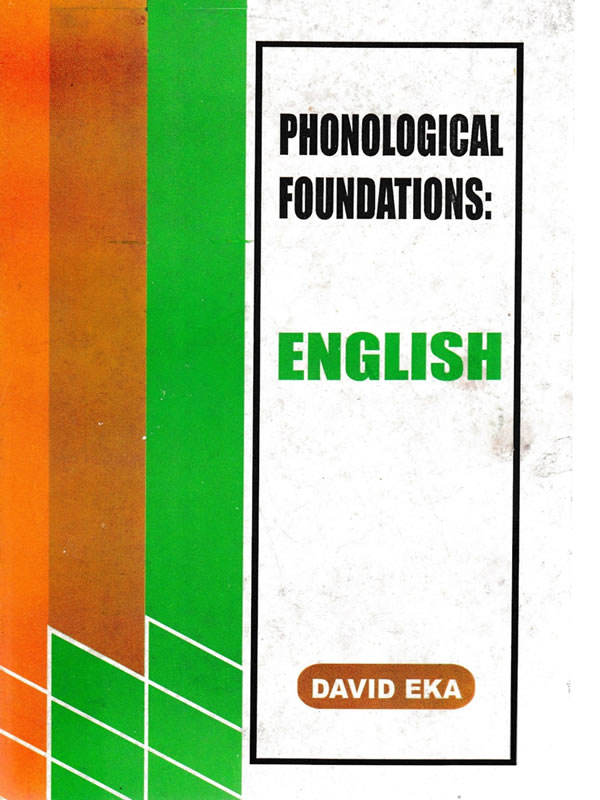Phonological Foundations: English by Professor David Eka
$4.00
ABOUT THE BOOK
Phonological Foundations: English deals with segmental and nonsegmental features of English. It is written in a highly simplified manner for the purpose of encouraging a maximum of understanding by students/general readers with or without any previous knowledge of the phonology of English. For advanced students, the book promises to be a rich store phonological sign-posts for further progress. For universities, polytechnics and colleges of education generally and for those in the departments of English, Linguistics, Communication Arts, Theatre Arts and Education specifically, the book promises to be an invaluable source of information.
David Eka is a Ph.D. holder and an Associate Professor in the Department of English. University of Uyo. He is the Editor of Fundamentals of Communication in English: Chief Editors of Journal of Humanities. University of Uyo; author of Elements of Grammar and Mechanics of the English Language and co-author of Aspects of Spoken Language. He also has several journal articles and book chapters to his credit.
ISBN 978-2275-28-X
Description
TABLE OF CONTENTS
GENERAL INTRODUCTION
01 The Task and the Objective
02 English: The Variety Involved
03 The Text
PART ONE: SEGMENTAL PHONOLOGY SUBSTANCE
1 THE PATTERNING OF SEGMENTAL PHENOMENA IN ENGLISH
1.1 Foundation/Realities
1.2 Grouping of the Basic Sounds in English
1.2.1 Grouping of Vowels
1.2.1.1 Reflections and Further Grouping
1.2.2 Grouping of Consonants
1.3 Distribution of the Basic Sounds
1.3.1 Distribution – The Coverage
1.3.2 Distribution -.Specific Issues in Phonology
1.3.2.1 Paradigmatic Distribution
1.3.2.2 Syntagmatic Distribution
1.3.2.3 Complementary Distribution
1.3.2.4 Free Variation
1.3.2.5 Distributional Equivalence
1.3.2.6 Distributional Inclusion
1.3.2.7 Overlapping Distribution
1.4 Distinctive Features of the Basic Sounds
1.5 The Phonotactics of English
1.6 Review Questions
2 SOUND CHANGE
2.1 Preliminary Comments
2.2 Diachronic Sound Change
2.2.1 Historical Hints
2.2.2 Specific Changes: Old English to Modern English
2.2.3 The Great Vowel Shift
2.3 Synchronic Sound Change
2.3.1 Phonological Conditioned Sound Change
2.3.2 Assimilation and Similitude
2.3.2.1 Progressive Assimilation
2.3.2.2 Regressive Assimilation
2.3.2.3 Homorganic Assimilation
2.3.2.4 Similitude
2.3.4 Historical Assimilation
2.4 Weakening
2.5 Review Questions
NOTES TO CHAPTER2
PART TWO: NONSEGMENTAL PHONOLOGY
SUBSTANCE
3. INTONATION
3.1 Variations of Pitch in Natural Languages
3.2 Intonation in English: Key Notions and Variability
3.3 The Approach
3.4 Intonation in English: Patterns and Functions
3.4.1 Categories of Intonation
3.4.2 The Falling Pattern
3.4.3 Tag Questions
3.4.4 The Rising Pattern
3.5 Halliday’s System of Intonation
3.6 Review Questions
NOTES TO CHAPTER3
4 THE SYLLABLE IN ENGLISH
4.1 The Syllable: Explications
4.2 The Syllable in English: Its Structure
4.3 Syllable Juncture
4.4 Review Questions
NOTES TO CHAPTER4
5 ACCENTUATION AND RHYTHM
5.1 Accentuation
5.2 Accentuation and Accent
5.3 Accentuation and Stress
5.4 Accentuation in English: A Guide on Words in Isolation
5.5 Accentuation of Words in Connected Speech
5.6 The Rhythm of English
5.7 Review Questions
NOTES TO CHAPTER5
PART THREE: SUPPLEMENTS SUBSTANCE
6 PHONOLOGICAL UNIVERSALS AND THEORIES
6.1 The Focus
6.2 The Broad View of Universals
6.3 Phonological Universals
6.4 Phonological Theories
6.4.1 Generative Phonology
6.4.2 Natural Generative Phonology
6.4.3 Natural Phonology
6.4.4 Atomic Phonology
6.4.5 Autosegmental Phonology
6.4.6 Prosodic Theory
6.4.7 Metrical Theory
6.5 Review Questions
NOTES TO CHAPTER6
REFERENCES
INDEX
Prof. David Eka
Late Prof David Eka was an erudite Professor of English with more than 42 years experience. As a scholar who specialized in The Phonology of English, Sociolinguistics, General Phonetics, Applied Linguistics and Use of English/Language Planning, he had lectured and imparted knowledge to many in several Institutions across the nation and beyond. He held professional memberships in some bodies some of which includes Literary Society of Nigeria. A major part of his career had been with the University of Uyo, where he lectured and held several responsibilities within the Faculty of Arts and the University at large. He lectured 7 Undergraduate Courses, 4 Postgraduate Courses and supervised several Undergraduate and Postgraduate projects, thesis and dissertations.
He has authored several books, book chapters and journal articles, many of which can can be accessed on this website. He has been the Chief Editor to the Journal of Humanities for several volumes. He was a Ruling Elder in the Presbyterian Church. He is blessed with a beautiful family.
He is late now, but his works lives on.
Questions and Answers
You are not logged in
